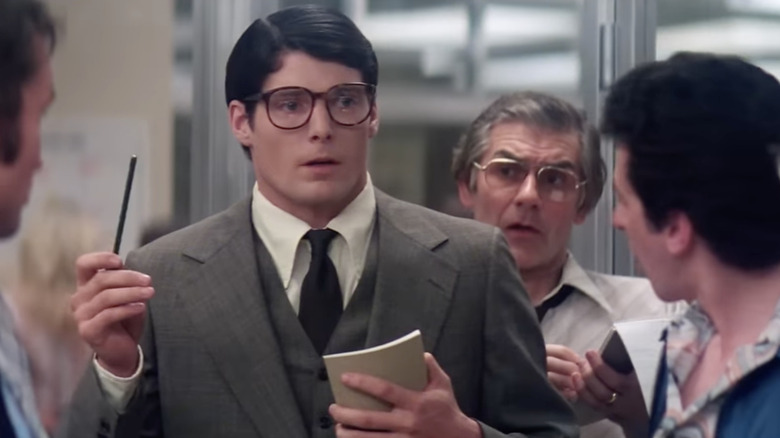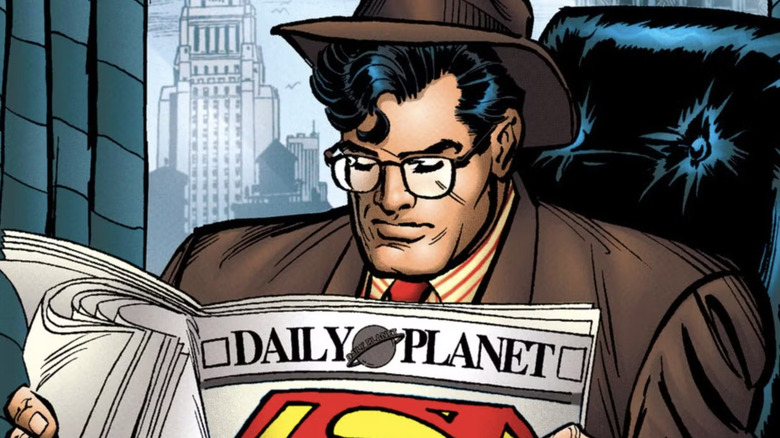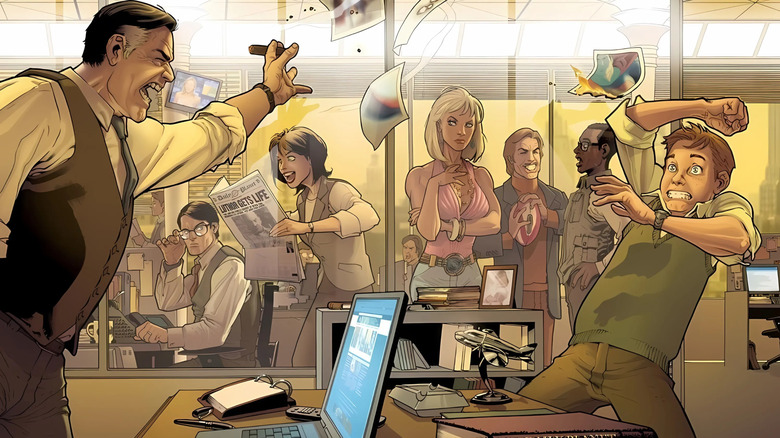The Real Reason Clark Kent Is A Journalist In Superman Comics
When I was a child, I always preferred Batman. But now that I've grown, I've realized that I'm much closer to Clark Kent — minus the glasses (and also the flying, super-strength, and red laser eyes). A stable journalism job at a major city print publication with his own apartment? Clark Kent is living the reporter's dream!
Most superheroes have day jobs where they wear different kinds of suits. (Well, except Hellboy, for whom monster hunting is his day job.) Take Matt Murdock/Daredevil: He's a defense attorney, showing he's a man who jumps to champion righteous causes and, also, a self-martyr. That Matt practices the law by day but takes it into his own hands at night also adds fundamental tension to his character. In the words of foundational "Daredevil" writer Frank Miller, only a Catholic like Matt Murdock could be a lawyer and a vigilante.
What about Superman, though? Since his first appearance in "Action Comics" #1, Clark Kent has been a journalist — but what does that say about his character?
Superman's creators, Jerry Siegel and Joe Shuster, likely picked their hero's job out of familiarity. The two of them first met in their teen years; while attending Alexander Hamilton Junior High School, they worked together on their school's student paper, the Federalist. Shuster drew a comic strip for the paper, "Jerry The Journalist." They even initially envisioned Superman as a newspaper comic strip, not sustaining a full-issue magazine.
As for the in-text reasons for his career, older "Superman" stories often said that Clark Kent chose to be a reporter to further his job as Superman. By working in a newsroom, Clark can be among the first to hear about trouble in Metropolis (like a bank robbery, a train running out of control, or a hostage situation). Clark jokingly spells it out to a disbelieving Lois Lane in "Superman: The Animated Series."
"Well, the truth is Lois, I'm actually Superman in disguise and I only pretend to be a journalist to hear about disasters as they happen and then squeeze you out of the byline."
But this answer only raises another question. Is Clark Kent's job just a cover, or is writing as much a vocation for him as helping people? And in the almost 90+ years since Superman first soared, has this rationale for him working as a journalist become obsolete?
What Clark Kent's journalism says about Superman's character
Aside from superhero comics' innate favoring of the status quo, I understand why "Clark Kent, mild-mannered reporter" has endured. So many of Superman's supporting characters — Lois Lane, Jimmy Olsen, Perry White, Cat Grant — work with him at the Daily Planet. Moving Clark Kent to a new job would take some major foundational revisions.
Plus, in keeping with the old "write what you know" axiom, writers often like to make their characters into writers. The Marvel and DC bullpens during the 20th century were often as bustling as a newsroom. When Stan Lee was editor of Marvel Comics, he even based Daily Bugle editor J. Jonah Jameson in "The Amazing Spider-Man" on himself. (Lee had even hoped to play JJ in the "Spider-Man" movie.)
Remember what Superman stands for, too: Truth and justice. Those are values a journalist should follow (at least in theory). The Daily Planet doesn't just further Clark's superheroics, it's another venue for him to help people.
Take "Superman Adventures" #18 (in continuity with "The Animated Series," written by Devin Grayson): Clark's Superman duties are impacting his ability to write, because he has to keep ducking out of interviews when he hears people in trouble. So Perry White assigns him a boilerplate story about the new city train line in Metropolis. But Clark makes a startling discovery: The line's bridge was hastily built, and if two trains cross it at the same time, it'll collapse. The story ends with an excerpt of Clark's article, showing how he doesn't need the costume to save lives.
I've been asking myself recently why I didn't see a writer-to-writer kinship with Superman before now. The first comic that spoke to me here was Kurt Busiek and Stuart Immonen's "Superman: Secret Identity." The premise is a bit convoluted: It's set in the real world, following a boy named Clark Kent whose parents named him as a joke/homage. Then, he starts manifesting the powers of Superman — but the superhero thing stays a side gig, next to his main job as a journalist and author.
Why Clark Kent chooses to be a journalist
"Superman: Secret Identity" answers why people would be drawn to read Clark Kent. To succeed, a writer needs a unique view of the world; Clark, who can soar above it, absolutely has that. It helps that "Secret Identity" has a more modern perspective on what being a journalist looks like (chapter 2 features Clark freelance pitching The New Yorker), compared to how many other Superman stories still write the Daily Planet like a newsroom out of "His Girl Friday."
Other "early year" Superman stories explore the beginnings of his normal career in other ways.
"Superman: Birthright" by Mark Waid and Leinil Francis Yu introduces the adult Clark Kent when he's on a reporting assignment abroad in Africa, interviewing a local political leader. In Waid's words, this opening "helps establish Clark as a journalist and not just a typist for the Planet."
The sometimes underappreciated Superman prequel TV series "Smallville" gave Clark a cub reporter best friend, Chloe Sullivan (Allison Mack), in high school. That shows how Clark himself got drawn to the job later in life, which "Smallville" then shows firsthand in its later seasons.
J. Michael Straczynski and Shane Davis' 2011 "Superman: Earth One" opens with an aimless Clark Kent moving to Metropolis. He interviews for several jobs across different fields, and could have any one of them. He chooses to be Superman, and a reporter, because he feels those give him the chance to make a difference — and find challenges. Perry White is the only one who doesn't want to hire Clark on the spot, since he feels Clark still needs to learn a lesson all reporters must: Write for your readers' satisfaction, not your own.
"Earth One" spotlights the still ongoing struggles of the newspaper industry. In that story, the Daily Planet is not a shining institution of Metropolis, but a husk with a revolving door staff. The only thing that saves it is getting to cover an alien invasion first hand — but no real struggling papers are going to get a boost like that.
Does Superman as a journalist still make sense in 2025?
Superman sometimes gets dinged as a supposedly "irrelevant" or outdated hero, whether because he's too invincible and/or too earnest for the cynical 21st century. Another reason might be that the image of "Clark Kent, intrepid reporter," with his fedora on and notepad out, feels quaint today, too.
That Clark Kent needs to be a reporter to quickly hear about and respond to trouble doesn't really hold up anymore. All he'd need is a cell phone, not to be in a newsroom. That's one of the big reasons the media is struggling: Everyone can get news from all over the world for free (including "news" posted with sometimes little to no verification), compared to 1938, when people needed to subscribe to their local paper to get the latest breaking stories.
In Jason Aaron and Rafa Sandoval's new "Absolute Superman," which reimagines Superman as if he'd been conceived today, he's not a journalist named Clark Kent, but a miner working in Brazil. Siegel & Shuster saw Superman as a champion of the underdog and working class, and reinvigorating that idea for 2025 meant pulling Superman out of the newsroom.
Other updates try to maintain Clark Kent as a reporter. "Batman V Superman" features Clark (Henry Cavill) trying to report on Batman's ruthless vigilantism, even journeying to Gotham to interview victims, but Perry White (Laurence Fishburne) isn't having it. This hews towards the other reason Superman chooses to be a reporter, since it allows him to perform crusades in and out of the cape.
James Gunn's upcoming "Superman" is also giving us a reporter version of Clark Kent — even if the Daily Planet office looks way too big, and well-staffed, for a modern newspaper.
Then again, as Alan Moore so succinctly put it in "Whatever Happened To The Man Of Tomorrow," Superman is "an imaginary story." I'd wish I didn't live in a world where "a perfect man who came from the sky and did only good" is as much a fantasy as journalism being a sustainable industry.




